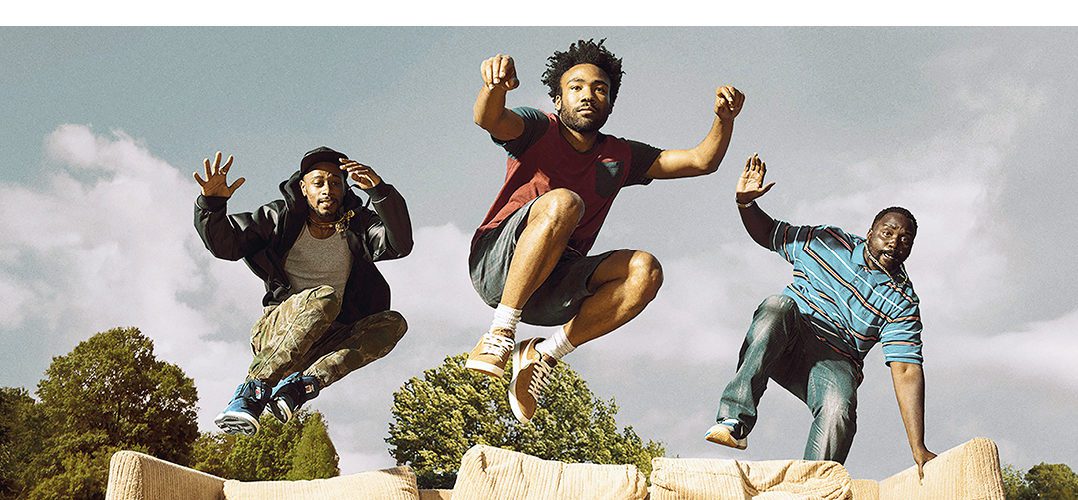A-list stars, exotic locations, production wizardry — there’s no question that the SVOD giants have transformed the industry’s approach to creativity, along with audience behaviour and expectation.
The arrival of Netflix and Amazon, and the ensuing fightback by the pay-TV and free-TV players have transformed the scale and ambition of TV drama. Emmy nominees including Netflix’s The Crown, HBO’s Game Of Thrones, Hulu’s The Handmaid’s Tale, Showtime’s Patrick Melrose and FX’s Atlanta (above) or The Assassination Of Gianni Versace: American Crime Story scratch the surface in terms of what is now on offer to viewers in this golden age of scripted TV.
It is not just the level of ambition that has changed, however — it is also the creative freedom that is evident across the international market. “For me, one of the biggest shifts is that producers no longer have to create content for specific broadcast slots,” says Stuart Baxter, president of eOne Television International. “SVOD has changed the rules so creatives have more freedom to try different things. Then you have to couple this with the fact that the global viewing audience is so large and disparate. This means that there is sufficient critical mass for producers to try all kinds of different genres of scripted programming.”
It is unlikely, Baxter says, that eOne would have become involved with a mini-series like Gaddafi, developed by Roberto Saviano (Gomorrah), a decade ago. “This is a multilingual drama [in Arabic, Italian and English]about a Libyan dictator. After series like Narcos and Deutschland 83, it’s a great illustration of how the range of scripted TV has grown.”
The richness of the new creative landscape is equally evident in period drama, which is no longer restricted to a few iconic novels and universally known subjects. “We are in development on A Gentleman In Moscow,” Baxter says. “It’s a fabulous period piece based on the novel by Amor Towles. It follows an aristocrat who is placed under house arrest in a Moscow hotel for 40 years and sees history unfold through his window. Kenneth Branagh is now attached to star.”
There is also a sense, Baxter adds, in which the SVOD platforms can offer a creative renaissance — an opportunity to revisit ideas and reformulate them. He cites the example of Designated Survivor, cancelled by ABC after two seasons, but rescued by Netflix for season three. Netflix will make the show less procedural in tone and drill down on topical issues, such as political campaigning, smear tactics and fake news.
Sonar Entertainment’s executive vice-president of television series, Jenna Santoianni, agrees that the barriers to creativity are down: “No one is saying you can’t make a show about this anymore,” she says. “The TV industry has learned that the audience is smart and engaged, and not to underestimate it.”
That was why Sonar felt comfortable boarding Das Boot, which has an international cast and is told across three languages. “I’m not sure that would have happened five or 10 years ago but, now, the reception to non-English-language drama has changed completely,” Santoianni says.
In terms of other Sonar projects that “push the envelope”, Santoianni picks out The Hunt, the much-anticipated Jordan Peele drama for Amazon Prime: “That will be a wild ride. It’s set in a 1970s world where the US government has been complicit in giving key strategic jobs to former Nazis, and these Nazis are now planning to build a Fourth Reich. They are challenged by a group of New York-based Nazi hunters, who set out to bring them to justice.”
The paradigm shift in creative approach also extends to the length of shows, Santoianni says: “There’s no formula regarding the number of episodes, or even episode length. Increasingly, it’s about who has the creative vision, and what they think is best for the show.”

This willingness to trust the creative talent regarding length is made possible to some extent by the trend towards binging, which itself opens up another debate about the importance of narrative hooks and cliffhangers. When viewers are watching two or three episodes of the same show back to back in one night, perhaps stopping mid-episode and picking the show up again later, or even on a different device, the pressure to conform to traditional lengths is diluted.
Perhaps not surprisingly, diversification in subject has also allowed the TV industry to cut loose in terms of screen representation. While the industry still has some way to go behind the camera, there has never been such a rich array of female-led TV drama, with Killing Eve, Glow, Big Little Lies and The Handmaid’s Tale notable examples. With Killing Eve having sold around the world and recommissioned for a second season, Endeavor Content’s Laura Andrews, vice-president of scripted programming, and agent Lorenzo de Maio, say the show reinvents a traditionally male-dominated genre through a female, diverse, character-driven perspective: “In many ways, it captures what we’re focusing on: projects that cut through the noise with a unique voice and point of view to achieve critical acclaim as well as success internationally. We’re really proud of the response from audiences around the world.”
In a similar vein, comedy is no longer the preserve of white casts, thanks to the creative renewal driven by SVOD and adopted by pay TV and free TV. Atlanta, Black-ish, Dear White People, Master Of None, The Mindy Project and Chewing Gum are examples of how the creative and cultural constraints on comedy have been removed.
How people self-identify sexually is also undergoing an overhaul. After eOne’s polyamorous drama You Me Her last year, All3Media International has just reported early pre-sales for The Bisexual. A six-part series written, directed and starring Desiree Akhavan, the show explores the differences between dating men and women from the perspective of a person who finds herself doing it. Commissioned by Channel 4 and Hulu, The Bisexual has been picked up by Stan in Australia and Canal+ Group, which will broadcast it in France and all its territories. Stan chief content officer Nick Forward says Akhavan’s “unique take on the complications of modern dating is incredibly timely”.

The notion that nothing is now off-limits extends to books that may have previously been thought of as impossible to adapt for TV. Netflix is just getting its teeth into Salman Rushdie’s Midnight’s Children, while Paramount is on board George Clooney’s adaptation of Joseph Heller’s Catch 22. Paramount Pictures’ president of worldwide television, Dan Cohen, says: “It’s interesting to see how a production like Catch 22 is appealing to channels and platforms right across the spectrum, from Hulu in the US to Channel 4 in the UK via Sky Italia.”
Like Santoianni, Cohen says distributors have learned — within reason — to be comfortable with whatever length the producer chooses to deliver: “We work with what the creative side come back with. Catch 22 is complete in six episodes and Yellowstone is 10. But with Paramount TV’s new adaptation of The Vampire Chronicles novels, we’re looking at a franchise that has the potential to return.”
With 70% of Paramount’s TV revenues coming from international, Cohen says his division is “definitely interested” in foreign-language scripted content. He adds: “There are some great shows out there like Gomorrah, so it’s important for us to view scripted as a global market. I think it’s interesting that Argentine channel Telefe is making a Spanish-language version of the Alfred Hitchcock movie To Catch A Thief.”
Another creative element that has become core to the new TV age is the increasing importance that is being placed on directorial vision. While strong IP, recognisable casts and proven showrunners are all important elements in the package, a distinctive directorial vision is regarded as a way of cutting through the clutter of competition. Cohen cites Jean Marc Vallee (Big Little Lies; Sharp Objects, produced by eOne and Blumhouse for HBO) as a high-profile example. “And we now have Cary Fukunaga [True Detective; Bond 25] lined up on the limited series Maniac,” he adds.
Increasingly, this emphasis on directorial vision is not just about cutting through the clutter, but also about finding a way to produce a story that will resonate across borders, cultures and languages. While it would be wrong to call this a comprehensive or universal trend — there are plenty of dramas that work in the opposite direction — there is no question that a growing number of dramas are paring back scripts and relying more heavily on visual components. eOne’s Baxter also cites the growing importance of “music and the use of silence”.
Liam Keelan, scripted portfolio director at BBC Studios, says a similar point can be made about landscapes and locations, which have almost come to be characters in contemporary international dramas. “You saw this in War And Peace and it’s present again in our upcoming adaptation of Les Miserables,” he adds. “More than ever, it feels like you need to be producing the definitive version of a story, so a lot of money is being spent to get every element of the production right.”

More generally, Keelan agrees with his peers that the creative face of TV drama has been transformed: “There is still room for the live mainstream TX event, which we’ve seen recently with The Bodyguard on BBC One in the UK. But there’s certainly more variety in the market.”
On books that might previously have been viewed as unadaptable, Keelan cites plans by the BBC to adapt Vikram Seth’s epic A Suitable Boy. As for projects that push the envelope in subject matter, he points to Pure, a Drama Republic series for Channel 4 that BBC Studios is distributing internationally, “It’s an amazing piece of work, which explores a young woman’s struggle with mental illness,” he says.
The BBC’s McMafia is a recent example of an international-facing drama that probably would not have been made a few years ago. “And coming up we have MotherFatherSon, about a media mogul and his family. That’s being written by Tom Rob Smith [The Assassination Of Gianni Versace] and stars Richard Gere in his first TV appearance in more than 30 years,” Keelan adds.
The ability to lure Richard Gere into TV is clearly a hallmark of this new era. But as the reinvention of comedy illustrates, there is also room for new voices. Adam Cunningham, chief digital officer at entertainment agency Allied Global Marketing, sees a similar development with young-adult (YA) drama: “13 Reasons Why, produced by Anonymous Content and Paramount Television, has been a big success for Netflix. It’s not a star vehicle, but it has an amazing energy to it. I think the lesson for the TV industry, which wants to attract younger audiences, is that the show’s authenticity is more important than whether it has stars.” A similar line of argument could also apply to other acclaimed Netflix YA series, including Stranger Things and The End Of The F***ing World.
The renaissance in comedy and YA is especially interesting when one considers that short-form mobile-first content has not managed to build up much momentum, despite the fact that this is the platform to which young audiences increasingly turn first. In Cunningham’s opinion, it is a mistake to try to characterise mobile as a genre: “Mobile is a device not a genre. A lot of money has been spent trying to develop mobile-first content and it hasn’t proved successful.”
Cunningham believes that one reason why the audiovisual content industry is seeing this injection of creativity is because streaming is “not really a modern version of TV. It’s closer in many ways to film. The cultural shift we’ve seen is that many of the elements that used to be reserved for film have been adopted and evolved by streaming, which is not subject to the same level of regulation as TV.”
These trends are not limited to Europe and the Americas. In India, OTT is expanding dramatically, with the online video audience is expected to reach 500 million by 2020. With the likes of Netflix, Amazon, Hotstar and Hooq leading the pack, the kind of content being consumed in India is being transformed, says Jimmy George, head of sales and acquisitions at Mumbai-based GoQuest Formats. “I think the biggest thing we are seeing is that anything is possible,” George adds. “TV has traditionally turned to publishing as a source for ideas, but even a podcast can inspire a series now.”

In some ways, the series format issue is even more obvious in markets like India, where audiences are used to watching shows with hundreds of episodes. In a trend that echoes developments in Brazil, Mexico and Turkey, George says the new platforms create a parallel opportunity for productions with fewer episodes, whether domestically produced or acquired.
Keshet International CEO Alon Shtruzman agrees that the arrival of the SVOD players has “opened the door to foreign-language content and granted it access to travel internationally”. He adds: “Only a few years ago, it was widely believed Hebrew-language content couldn’t travel — you had to sell the format and adapt it locally. Fast forward to 2018, and you can watch foreign-language dramas from all over the world on these platforms, including many of ours. False Flag is on Fox’s global channels, The Baker And The Beauty is on Amazon, and Prisoners Of War is on Hulu. Last week, our black comedy Stockholm received its international premiere at the Toronto Film Festival as part of the primetime schedule — the first Hebrew TV series to ever be selected.”
According to Shtruzman, this shift has had a tangible impact on how Keshet International operates as a business: “Finished tape sales are now as important to us as formats. Hence the recent launch of our KI Content Fund and our acquisition of Greenbird Media to guarantee continuing pipelines of high-end drama and factual finished tape with global appeal.”
Revital Basel, managing director of Keshet International Networks, has also witnessed how the business is adapting to support this new era of creativity. “For us, the evolving content landscape is creating a wealth of new opportunities,” she says. “With creative content hubs in Israel and all over the globe, and our flexible can-do approach to business models, we already have a lot of co-development and co-production deals under our belt, such as Prisoner Number One, the drama series we’re co-developing with Telemundo.”
In Basel’s opinion, the big thing that the streamers have brought is “edge”. She elaborates: “We can push things editorially on these platforms that would ordinarily be an issue for linear channels — there is almost nothing that’s off-limits. In addition, these new platforms also allow us to reach out to more niche audiences with our formats and take more risks. There is less need to appeal to the mainstream.”
Of course, even in this golden age, not everything is great. Possible creative downsides in the new world of content include a shift towards style over substance, and a loss of word craft as producers increasingly rely on directorial conceits, SFX whizzbangs and lingering location shots. Some shows are a slack 10 episodes when they should be a taut six.
Paramount’s Cohen, ponders the loss of a shared sensibility: “It’s harder to have those watercooler moments when you’ve binge watched a series and your friend is following it via a more conventional scheduling pattern.”
BBC Studios’ Keelan says the increasing cost of drama is a concern — a sentiment shared by many in the industry. The question then arises as to whether the bubble will burst, forcing the market back in the direction of more locally produced drama and lower cost factual shows.
Allied’s Cunningham points to the risk of homogeneity as channels and platforms aim to please scores of markets, though he acknowledges that Netflix’s localisation investment is a recognition of this. “There is such a lot of content out there now that there’s almost a Darwinian feel to the market,” he says. “Creators really need to double down on quality and authenticity if they want to stand out.”
Extending this point, content discovery is an increasingly significant challenge for the industry. Echoing the film business, the focus on creative marketing is likely to become a bigger issue going forward.
This feature was originally written by Andy Fry for the MIPCOM News, and edited for MIPBlog.




